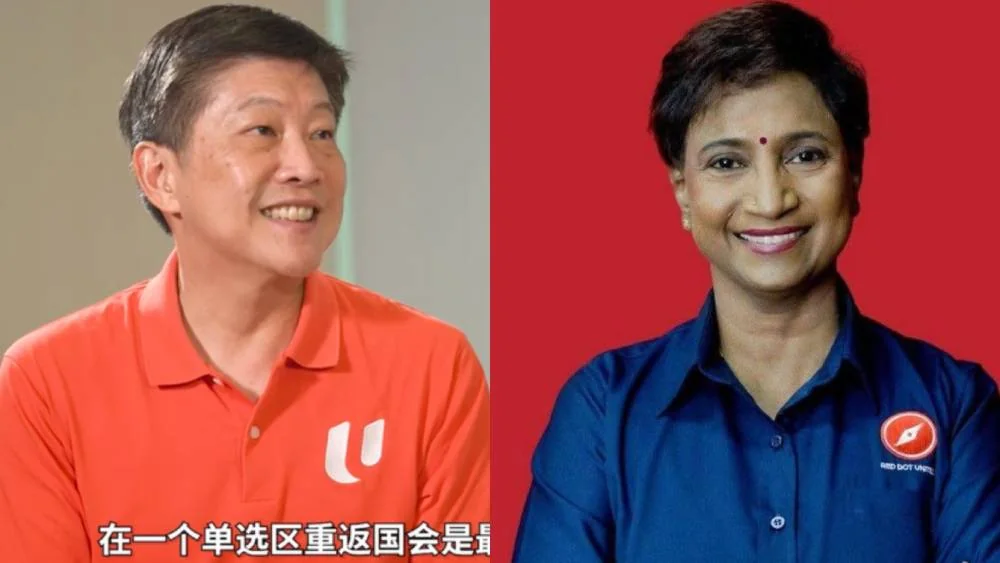Jalan Kayu单选区 - 两块“木头”间的艰难抉择
黄志明与卡拉·马尼卡姆的对决揭示信任与分裂的较量

2025年5月3日,Jalan Kayu单选区(Jalan Kayu SMC)的29,565名选民将站在十字路口,选择两条崎岖路径之一:人民行动党(PAP)职总秘书长黄志明,背负2024年职总英康收购案的污点,宛如一辆伤痕累累的战车;抑或红点团结党(RDU)的激进教育家卡拉·马尼卡姆,其2021年前进党诉讼风波暴露的个人主义倾向,恰似一艘独木舟在政治风浪中摇摆 [译注:2025年4月22日,红点团结党宣布退出Jalan Kayu单选区,支持工人党参选,以避免多角竞争。本文基于此前候选人假设撰写]。
候选人背景
黄志明(56岁)
黄志明曾于2009至2013年担任新加坡空军总长,2013至2015年升任三军总长,展现军事生涯的严谨与权威。2015年,他代表人民行动党当选巴西立-榜鹅集选区国会议员,但在2020年竞逐盛港集选区时,以47.88%的得票率铩羽而归。自2018年起,他担任职总秘书长,力推劳动力发展和工人权益政策,试图为职场注入活力。然而,2024年职总英康收购案令其公信力蒙尘,被舆论抨击“要么纵容利益输送,要么严重失职”,如同一座信任堡垒被风暴侵蚀。
卡拉·马尼卡姆(57岁)
卡拉·马尼卡姆是单亲母亲、特殊教育专家兼中小企业主,拥有终身教育硕士学位,散发草根魅力。她是新加坡武装部队首批女军官之一,服役七年,官至中尉,彰显坚韧。2020年,她代表前进党竞选义顺集选区,获38.76%选票;同年12月被开除,2021年提起“不当终止党籍”诉讼,后和解。此事暴露其“独行侠”作风。如今,她加入红点团结党,聚焦职业培训和生活成本压力,试图以小党之力撬动选民心弦。
黄志明的职总英康风波
2024年7月,职总与德国保险巨头英杰华(Allianz)提出22亿新元的收购案,宣称将增强职总英康的竞争力。8月,黄志明与职总主席达纳拉克希米发表联合声明,信誓旦旦保证英杰华将维护英康的社会使命。然而,细节如暗礁般浮现,险些葬送交易。英杰华计划提取18.5亿新元资本,近半投资可迅速回笼,恐耗尽维持低保费的储备金,宛如从社会保障的根基抽梁换柱。2024年10月14日,文化、社区及青年部长唐振辉代表政府果断叫停交易,认定其背离英康2022年公司化目标,即强化财务实力以惠及保单持有人。
黄志明坚称职总中央委员会对资本提取计划毫不知情,试图撇清责任,但前英康首席执行官陈瑞财痛斥该计划“违背诚信”,直指交易暗藏私利。新加坡管理大学副教授陈庆文直言,这种无知“令人瞠目结舌” [译注:意指难以置信的疏忽],如同指挥官在战场上迷失方向。2025年1月,黄志明将就业不稳定性归咎于人工智能,回避外籍劳工政策争议,被批“高高在上”,如同一座与民意脱节的孤塔。2020年盛港集选区失利已暴露其政治软肋,选民不禁质疑:他究竟是工人代言人,还是行动党机器的忠实齿轮?
卡拉的前进党诉讼争议
2021年7月,卡拉向高等法院起诉前进党,后移交国家法院,掀起政治风波。她要求宣告2020年12月开除决定“违法无效”,并追讨1万新元竞选开支,指控前进党违宪,未给予她申辩机会。前进党提交七份宣誓书,包括党魁陈清木的证词,指控她破坏团队凝聚力、抗命不遵。同区候选人郑德源透露,她跳过团队会议、擅自组织走访,形同独奏而非合唱。17人联署反对其复职,干部以55:11的投票支持开除决定。
陈清木回忆,2020年11月会议上,卡拉“挑衅好斗”,高喊“证据呢?证据呢?”,如同一头不甘受缚的猛兽。她通过脸书和法庭公开控诉,展现原则性,却也暴露分裂倾向,宛如在政治舞台上独舞。转投红点团结党被批“机会主义”,如同一名独行侠在寻找新战场。诉讼虽和解,但卡拉的个人主义标签挥之不去,恐难适应新加坡强调协作的政治生态。
选情分析
黄志明依托行动党强大的基层网络,Jalan Kayu单选区与宏茂桥集选区的历史渊源为其加分。然而,英康风波重创公信力,盛港失利阴影犹存,选民质疑其是否真为工人发声。卡拉的草根形象贴近民心,反对党协调机制或助其整合选票,但诉讼风波暴露团队协作缺陷,红点团结党知名度有限,难以撼动主流。工人党未派候选人,人民力量党若参选可能分散反对派选票,但红点团结党与其他小党的协调或可缓解分裂风险。这场选举无关谁是耀眼的明星,而是两块“卡由”(马来语“木头”谐音,喻指不完美的候选人)中,谁能更稳固地承载选民的期望。

